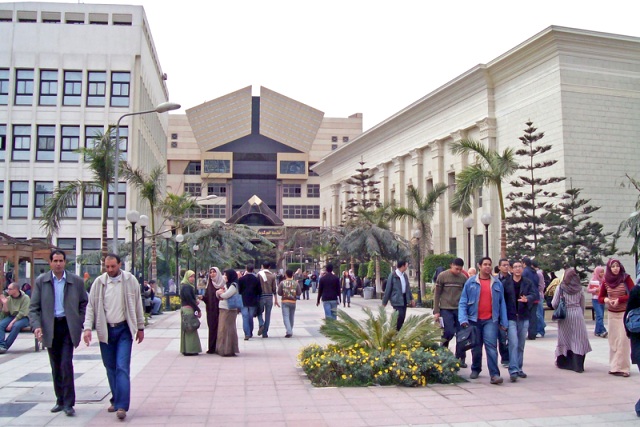Perhaps Kafka’s landmark novel “The Trial” about a man taken into questioning and tortured by unknown secret agents would fit succinctly as a parallel to the repressive ways of Hosni Mubarak’s former regime.
A close look shows that at some point, the secret agents were themselves whipped for torturing the protagonist, K. Meanwhile K continues in an unending litigious circle not knowing where to turn to, only to finally meet an unfortunate fate. We never know what actually happened to his initial tormentors.
Sometimes Egypt’s papers seem like clippings from an Oriental version of Kafka’s world, which causes us to call real-world parallels Kafka-esque.
Mubarak is set to appear for the second official hearing of his trial today at the Police Academy. According to all newspapers today, he is healthy enough.
However, as state-run Al-Akhbar points out, this time Mubarak and his sons, Gamal and Alaa, will be the only defendants. Yesterday, former Interior Minister Habib al-Adly and six of his subordinates in the Interior Ministry appeared in the third hearing of their trial, charged with the first degree murder of revolutionaries.
The floggers appear to be being flogged.
Egypt’s flagship paper Al-Ahram says that Adly’s trial was disrupted numerous times due to insubordination and suspect disruptions. The judge postponed the next hearing to 5 September. Independent paper Al-Dostour notes that the suspects in this case stick to their usual hierarchical structure as Adly always enters first, followed by his subordinates, and sits alone on a bench up front while they sit in an orderly row behind him.
The nascent independent Al-Tahrir says that Field Marshal Hussein Tantawi, head of the Supreme Council of the Armed Forces (SCAF), may appear in court today to give his testimony – according to a military source – as per the request of both the prosecution and defense of the Mubarak trial.
Meanwhile Asmaa Mahfouz is the latest activist to be summoned by the military prosecution. Al-Wafd’s eponymous party paper says that “military prosecutors are accusing Asmaa of an offense against the SCAF.” She was released today on a crippling LE20,000 bail.
Independent paper Al-Shorouk says businessman Mamdouh Hamza helped gather half the amount, while young independent activists gathered the rest. Mahfouz says the court's prosecutors told her that another 32 activists will be summoned by military courts soon. Al-Akhbar quotes the head of the military court, Adel Mahmoud Morsy, as saying: “Freedom of expression cannot come with incitement.”
Aside from the trials, 34 political parties – known as the Democratic Alliance – gathered on Sunday at the headquarters of the Muslim Brotherhood’s Freedom and Justice Party to express many activists' and revolutionary groups' refusal of the proposed supra-constitutional clauses.
“They bowed to the Muslim Brotherhood’s will and came out with a vague and ambiguous statement,” says an Al-Akhbar headline.
Al-Shorouk quotes prominent Brotherhood member Mohamed al-Beltagy as saying it is not an Islamic alliance and includes many prominent secular parties such as the Wafd and the Ghad.
The group is concurrently looking into looking into some sort of consensus building, as long as it’s not a supra-constitutional group.
The Islamic institution Al-Azhar is aggressively campaigning for its own document, which according to Al-Wafd aims to create political consensus regarding the rights of Egyptian citizens, the general acceptance of an Egyptian identity, and rules of citizenry. Al-Ahram says that they are inviting political groups from all ends of the spectrum to adopt the document.
On Sunday, medical supplies importers inaugurated Egypt’s first syndicate to protect the rights of businessmen. This is not a typo. Egypt’s businessmen have created their own syndicate with the blessing of Manpower Minister Ahmed Hassan al-Borai. According to Al-Tahrir, Borai – who attended the launch – said that international businessmen have the right to form their own unions and syndicates. Al-Ahram says that Borai is threatening to resign if the law protecting the freedom to form syndicates and unions is not ratified.
New Higher Education Minister Motaz Khorshed said in an extensive Q&A with Al-Ahram that he is adamant about implementing a new higher education system in line with the new revolutionary tone. This comes days after the controversial minister incensed activist university professors by refusing to enforce the ruling that the deans of major public universities should be sacked.
Al-Tahrir says that the one month honeymoon between activist professors and Khorshed is over. It quotes various professors who all threatened to disrupt the coming academic year if Khorshed does not abide by the SCAF-supported ruling to replace all Mubarak-era university heads.
Al-Tahrir also says that on Thursday student groups will gather at the American University in Cairo campus to form the Union of Egypt’s Students, which would act as a lobby for higher education.
Lastly, Al-Ahram has an in-depth report into the problems that still face Egypt’s antiquities. According to the report, both official laws and security precautions are still allowing for a constant outflow of stolen pharaonic artifacts from Egypt’s museums and historical sites.
Egypt's papers:
Al-Ahram: Daily, state-run, largest distribution in Egypt
Al-Akhbar: Daily, state-run, second to Al-Ahram in institutional size
Al-Gomhurriya: Daily, state-run
Rose al-Youssef: Daily, state-run, close to the National Democratic Party's Policies Secretariat
Al-Dostour: Daily, privately owned
Al-Shorouk: Daily, privately owned
Al-Wafd: Daily, published by the liberal Wafd Party
Al-Arabi: Weekly, published by the Arab Nasserist party
Youm7: Weekly, privately owned
Sawt al-Umma: Weekly, privately owned




